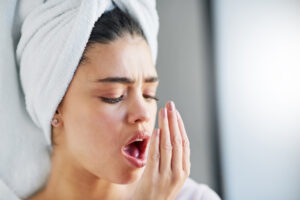-
Can Probiotics Help with Bad Breath?
 The Problem of Bad Breath
The Problem of Bad BreathBad breath is something that affects everyone from time to time, but for many people, it can become a chronic problem. In fact, bad breath, also called halitosis, ranks just behind cavities and periodontal disease in the list of reasons why people see the dentist. Going to the dentist is a good move, because, while bad breath can be the result of eating food like garlic, it can also be an indicator of oral issues like gum disease, cavities, and dry mouth. Your dentist can help rule these causes out, and may refer you to your primary care physician if there are concerns about health conditions that can cause bad breath, like diabetes or kidney disease. For most people, though, halitosis is caused by a blend of gases produced by mouth bacteria. Understanding that, scientists have begun to focus on using probiotics to help solve the problem of bad breath. Continue reading “Can Probiotics Help with Bad Breath?”
-
Ways to Freshen Your Breath When You’re On the Go
 You keep your teeth nice and clean and your breath fresh. Maybe you pride yourself in your sparkling smile and fresh breath. However, when you’re away from home or keeping a busy schedule, it can be hard to keep that breath as fresh as you’d like. What are some ways to keep fresh breath on the go? Here are some helpful tips for freshening your breath when you’re on the go.
You keep your teeth nice and clean and your breath fresh. Maybe you pride yourself in your sparkling smile and fresh breath. However, when you’re away from home or keeping a busy schedule, it can be hard to keep that breath as fresh as you’d like. What are some ways to keep fresh breath on the go? Here are some helpful tips for freshening your breath when you’re on the go.Continue reading “Ways to Freshen Your Breath When You’re On the Go”
-
How To Beat Bad Breath

Young woman checking breath.
Bad Breath-Let’s Get Rid of It
Bad breath, sometimes known as halitosis, is a blight many people bear. But what causes it? And how can we get rid of it once and for all?
What Causes Bad Breath?
- Certain Foods-Although all foods can cause bacteria buildup and bad breath, onions and garlic cause bad breath in a different way. They are absorbed into the blood stream and sulfur compounds are released once they reach the lungs.
- Poor Dental Hygiene-This is the most common cause of bad breath. Food left on the teeth is a very quick way to not smell great.
- Illness-Kidney disease, acid reflux, advanced diabetes, liver failure, and infection are also common causes of bad breath.
How Can We Get Rid of Bad Breath?
- Good Dental Hygiene-We know this. Brushing, flossing, and tongue scraping are great ways to keep a clean mouth.
- Regular Visits to the Dentist-It is imperative to visit your dentist. If you are worried about your breath, ask your dentist to help. The dental team at Park 56 is happy to help with breath issues.
- Stay Hydrated-Water is so beneficial to the body. It can help flush the body of toxins and wash food particles off your teeth.
- Stay Away from Alcohol-Based Mouthwash-Although that first burst of freshness can feel great, alcohol-based mouthwashes can dry out the mouth and cause worse issues with breath. Try to find a hydrating mouthwash.
- Quit Tobacco-Cigarettes, smoke-free tobacco, pipes, ecigs, and cigars are all stinky. There is no type of tobacco that is safe to use. And it is all going to cause bad breath. Stay away.
- Drink in Moderation-Red wine has good bacteria that can help reduce breath issues. One glass is fine. There are other types of alcohol that contain good bacteria. But for the most part, drinking is not good for your breath. Try to stick to a drink or two, a couple times a week. This way you won’t wreck your dental health and your breath will stay fresh.
Some Quick Remedies for Bad Breath
- Citrus-These delicious fruits are refreshing and can clean the teeth. Just don’t go crazy with lemons. They can be a little too acidic if not consumed in moderation.
- Milk-A glass of milk can cut down on onion or garlic breath.
- Apples-We all know that an apple a day keeps the doctor away. It can help keep you from dental issues, too. Apples are great at quickly cleaning the teeth.
- Yogurt-There are healthy bacteria in yogurt that can actually combat the harmful bacteria that causes bad breath.
- Parsley and Fennel-Certain herbs can combat bad breath when chewed.
- Sugar-Free Gum-Many dentists recommend chewing a piece of sugar-free gum if you don’t have the time to brush and floss between meals.
Park 56 Dental
When you are looking for the best advice about how to keep a healthy mouth and great smelling breath, the best place in New York is Park 56 Dental. Voted the number one dentist in the New York area, we have everything you need for perfecting that beautiful smile. For more information about dental services, to book an appointment, or to ask any questions about your teeth, visit our website or give us a call at (646) 679-3973. -
How Dieting Can Cause Bad Breath

Over the past ten years, there has been a lot of debate about low-carb diets such as the Keto and Atkins diets. Most of this discussion is about how they work, and whether they help people keep weight off for a long period. An overlooked aspect of these diets is their tendency to cause bad breath, also known as halitosis. Some people have taken to calling this phenomenon “keto breath.” How does this happen?
One of your body’s main sources of energy is glucose. Glucose is formed when your digestive system breaks down carbohydrates from complex sugars into simple glucose molecules. When you eat fewer carbohydrates, your body has to find other fuel sources (primarily fat) for energy. This metabolic state is known as ketosis.
When your body breaks down fatty acids, it creates a byproduct known as ketone bodies, or ketones. They come in three common forms: acetoacetate, beta-hydroxybutyrate, and acetone. These are regularly removed from your body when you exhale or urinate.
If you consume a low-carb diet, your body relies more on fatty acids for energy because you aren’t consuming as many carbohydrates. As you use up more fatty acids, more ketones are released as a byproduct of the metabolic process at work.
This surplus of ketones in your body can contribute to bad breath. But the ketones you exhale have very particular odors, which are mostly not like what you experience with normal diet bad breath.
There’s another bad breath factor with low-carb diets. The sudden transition from carbs to proteins changes how the body metabolizes food. The breakdown of protein creates ammonia. A sudden increase in dietary protein will only exacerbate this effect, increasing the amount of ammonia in your urine as well as your stomach gasses. Since it takes a lot of water to remove ammonia from your system, insufficient hydration can degrade your breath as this excess ammonia builds up in your body.
If low-carb diets have helped you, don’t despair. Some people on low-carb diets don’t develop bad breath. With others, it’s a temporary effect of the rapid diet change. And there are ways to mitigate the effect:
- Drink lots of water
- Use mints and/or gum to mask odors
- Brush your teeth at least twice a day
- Floss daily
- Transition slowly into your new diet and see how these changes affect you
If you’re experiencing halitosis, or if you just need the perfect place to get your teeth cleaned or fixed, choose the practice that was voted best dentist in NYC! At Park 56 Dental Group, we offer pediatric, prosthodontics, endodontics, oral surgery, Invisalign®, emergency, and sedation dentistry, all at the highest level of treatment. We serve the Midtown, Central Park, Upper East Side, Park Avenue, and all surrounding Manhattan and New York areas, with a patient-centered practice that has hours to fit your schedule. Schedule your complimentary consultation today by contacting us online or calling us at (646) 679-3989.
-
Why You May Still Have Bad Breath Even After Brushing and Flossing

You brush, you floss, you rinse, and you may even chew gum. So why do you still have bad breath? Bad breath, also called halitosis, is an embarrassing condition. It commonly comes from different parts of the oral cavity, but can sometimes be caused by an underlying health issue. How can you identify the cause and get rid of bad breath? Let’s look at some common scenarios that lead to halitosis.
- The most straightforward cause of bad breath is a dirty mouth. You’ve probably already tried brushing and flossing, but let’s discuss it just to cover all the bases. Bacteria, food particles, and mucosal cells your body sheds in your mouth can all lead to bad odors, so brushing thoroughly is your first line of defense against halitosis. You have to really get into every nook and cranny of the mouth, and if you have crooked teeth this can be difficult. If it seems like your crooked teeth are harboring odors, consider braces to improve your oral hygiene. And here’s something you may not know: the tongue is the most common place for bad breath to originate, because people often forget to brush their tongues. If you think your tongue may be the culprit, you can brush it with your toothbrush or get a tongue scraper.
- Gum (periodontal) disease can cause bad breath. If you’ve been lax with your dental hygiene, allowing plaque to accumulate around the teeth, you may end up with a tartar build up. This can cause gum disease, known in the early stages as gingivitis. This is an infection of the gums, but as it advances, it can cause the bone around your teeth to deteriorate and decay. As you can guess, this smells unpleasant. Regular dentist appointments are the only way to identify and stop the progress of periodontal disease.
- A dry mouth can have a bad odor. Saliva flow is necessary to keep the mouth free from debris, so if your mouth is dry, it can lead not just to bad breath but also to cavities and gum disease. Some medications can cause dry mouth, as can alcohol and tobacco products. Talk to your dentist about dry mouth treatment if this seems to be your problem.
- Health problems can cause halitosis. Post-nasal drip from a sinus infection, cold, flu or strep throat can attract odor-causing bacteria. Acid reflux and chronic conditions like diabetes, kidney failure, liver failure, peptic ulcer, or intestinal blockage can all be the root of bad breath.
To keep your mouth healthy, clean, and smelling good, regular dental appointments are important. At Park 56 Dental Group, we offer pediatric, prosthodontics, endodontics, oral surgery, Invisalign®, emergency, and sedation dentistry, all at the highest level of treatment. We serve the Midtown, Central Park, Upper East Side, Park Avenue, and all surrounding Manhattan and New York areas, with a patient-centered practice that has hours to fit your schedule. Schedule your complimentary consultation today by contacting us online or calling us at (212) 826-2322.
.
RECENT POSTS
categories
- Uncategorized
- Cosmetic Dentistry
- Veneers
- Healthier Teeth
- Teeth Whitening
- Dental Health
- Video
- Dental Emergencies
- Invisalign
- Dental Implants
- Root Canal
- Sedation Dentistry
- Infographic
- Dental Crowns and Bridges
- Dental Anxiety
- Gum Disease
- COVID-19
- Bad Breath
- New York Dentist
- Cut out sugar
- General Dentistry
- Oral Health
- Oral Cancer
- Dry Mouth
- Gum Health
- Toothache
- Dental Sealants
- Cavities



